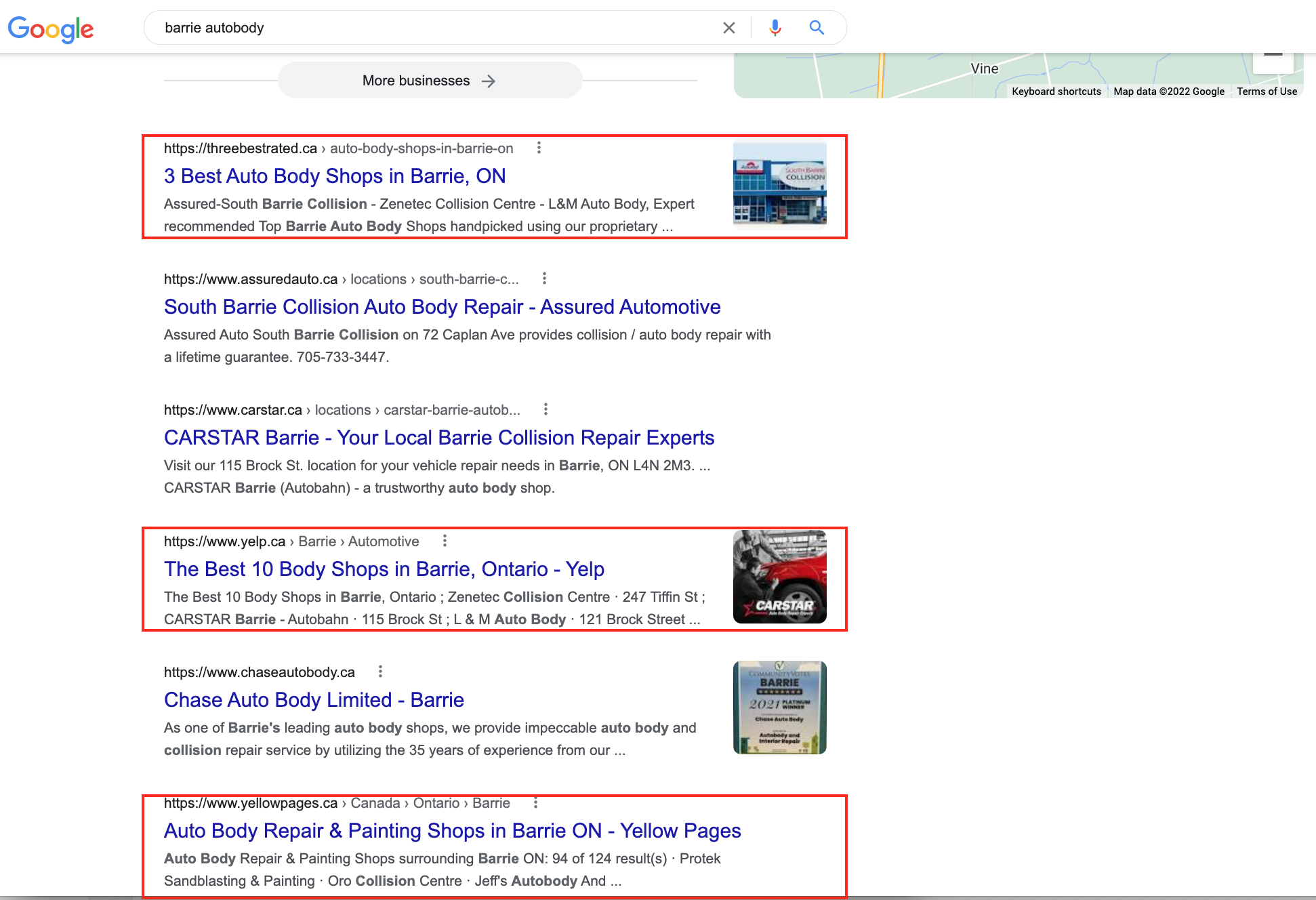The primary goal of local SEO is establishing visibility for a local business in the Local Map Pack and/or the top three organic search results. These typically reside just below paid Google ads and the Map Pack.
As with all SEO, myriad factors (i.e., the (in)famous Google algorithm) come into play to determine which businesses get top billing and the resulting coveted organic search traffic.
One set of factors from a local SEO perspective is local presence, relevance, and authority.
In other words, and from a common sense perspective, local businesses need to prove to the search engines:
- They are indeed physically located within close proximity to their customer base.
- They provide services or products which fall into specific categories.
- They are a trusted/authoritative content source and answer their customers’ questions.
Local directories, by definition, are a vehicle through which businesses can address all three of these factors.
As such, the simple answer to our introductory question is yes, you do still need directory submissions for local SEO.
However, not all directories carry the same weight or authority and should be reviewed relative to the value they can offer.
This becomes particularly important for those directories requiring a fee for inclusion.
Further, there are some best practices related to data and contact information consistency to consider during submission.
Finally, tools are available to make the directory listing setup and ongoing maintenance process quicker, particularly for businesses with multiple locations.
There are a lot of directories, and maintaining information and content across all of them can become a burden for a small business.
We’ll review how to address each of these factors and how directories can help or hinder local businesses’ efforts to get found.
Local Presence And Consistency
It should be fairly obvious that for a business to rank well in a particular location, it must be able to prove it exists, resides, or is otherwise able to provide services within its specified service area.
Two primary vehicles for establishing a business’ location are its website and its Google Business Profile (GBP).
A local business website, when applicable, will include its physical address details, which can be tagged with local business schema to make it easier for Google to find and index.
Many sites will also include a map (preferably a Google map), which will likewise be referenced for location validation.
Lastly, geographic details can be incorporated into the title and heading tags, where appropriate, to reinforce the local focus of the business.
Creating and optimizing a Google Business Profile is effectively the process of reinforcing the information and focus of a local business website. Or, for some businesses, the opposite is the case.
Name, Address, and Phone Number (NAP) information should naturally match across these two properties.
Service areas chosen in GBP should be within close proximity to the business location.
Service categories should likewise be consistent.
Local directories then become an extension of these two primary points of web presence and validation for search engines.
Here too, the goal should be consistency, particularly for NAP information along with website URLs
Pro tip: If you can include more than one URL in a local directory listing, you should look to include as many relevant locally oriented links as possible, e.g., a link to your GBP profile, your Facebook page, and listings in other relevant local directories.
Local Relevance
Establishing local relevance is all about making sure you and your content are appearing in the correct directories and appropriate categories.
Naturally, any categorization should align with how you’ve defined your services or products on your site and in GBP.
There are three types of local directories you can identify and consider submitting listings to.
The first type we’ll call “global” directories. These are services like Yellow Pages, Yelp, and the like, which offer local listings and reviews in nearly every location around the world.
Many of these offer free “listings” but then demand a fee for advanced features, functionality, and/or visibility.
One way to determine whether or not paying a listing fee is advisable is to conduct an organic search on the primary keywords you want your business to be found for, and see whether or not the directory ranks well (or better than you) for those keywords in local search engine results pages (SERPs).
You can also simply ask a rep from the directory whether or not they can provide stats on the organic/referral traffic your paid listing will be able to deliver.
If they cannot provide such stats, you can be wary of their ability to provide a return on your investment.
 Screenshot from search for [Barrie autobody], Google, August 2022
Screenshot from search for [Barrie autobody], Google, August 2022The same evaluation methods may be used here to determine whether or not these services can potentially deliver value to your business.
The third and final type is the more locally specific directories offered by local Chambers of Commerce, Service Organizations, and other non-global players.
The first two of this type should certainly be considered, as they can have the effect of validating local presence in a less subjective way.
Small, local non-global directories should, as above, only be considered if they can likewise prove the value they will deliver from an organic visibility or referral traffic perspective.
The directories you choose to submit to, and the categories within which your products or services can be readily found, will help to define your business’ relevance within your local community.
Local Authority
Listings within local directories, particularly those with established authority of their own, can help to boost the authority and potential visibility of a business.
You can also use the SERP test mentioned above to identify these authority boosters.
In essence, any directory which outperforms your website or GBP page for a target keyword represents an opportunity to both be found via the directory and gain authority through it.
Some directories, a la GBP, enable content or links to content to be shared.
While this can be time-consuming, it may be worthwhile to distribute your content to these directories in addition to other places like GBP and social media, depending on the visibility and relative local authority of the directory.
Reviews
As noted, many directory services offer review submissions – and while Google reviews are naturally preferred from an organic authority perspective, Google and the other search engines are aware of reviews published on other platforms.
Similar to the local SERP test, you should pay attention to whether or not either you or your competitors have been receiving reviews in places other than GBP.
Keep in mind that your potential customers may be looking at these reviews as well when considering purchasing from your business vs. another.
Managing Multiple Locations
Setting up and maintaining listings across multiple directories will take time, particularly if there are ongoing updates to business details or services.
This is, of course, amplified for businesses with more than one location.
There are paid services and solutions like Uberall, Semrush, and Yext for centrally managing multiple locations, which will typically cover the first two types of local directories referenced here, along with mapping services like GBP, Apple Maps, and Facebook locations.
Some of these services also enable review and social account management.
How Are Your Directory Listings?
So, yes, it’s safe to argue directory submissions are still required for effective local SEO.
To this end, perhaps the best place to start is with the suggested SERP test to understand where your listings and the directories stand relative to your keywords.
Alternatively, many of the listings management services offer a quick auditing tool to help get a sense of what coverage a business has across the most common local directories.
Then you can decide on a submission strategy that fits your visibility and traffic goals, as well as your budget.
More resources:
- 21 Web Directories You’ll Still Want To Use
- Local SEO Schema: A Complete Guide To Local Markup & Rich Results
- Local B2B SEO: The Complete Guide For Local Businesses
- A Guide to Local SEO
Featured Image: LightAndShare/Shutterstock





![AI Overviews: We Reverse-Engineered Them So You Don't Have To [+ What You Need To Do Next]](https://www.searchenginejournal.com/wp-content/uploads/2025/04/sidebar1x-455.png)